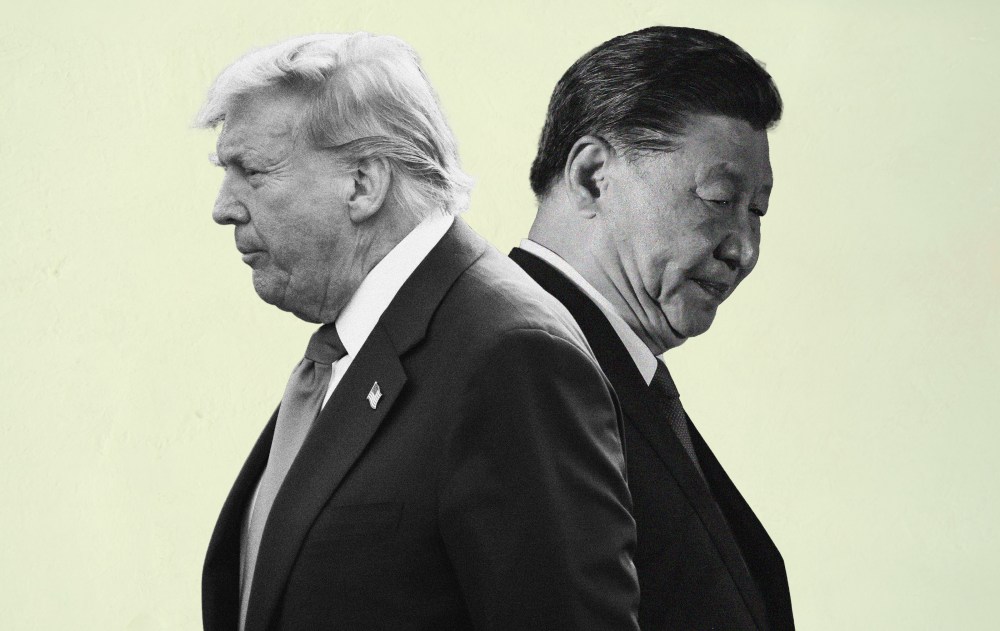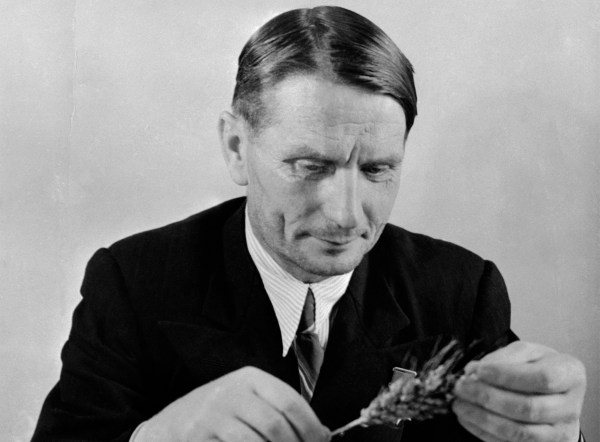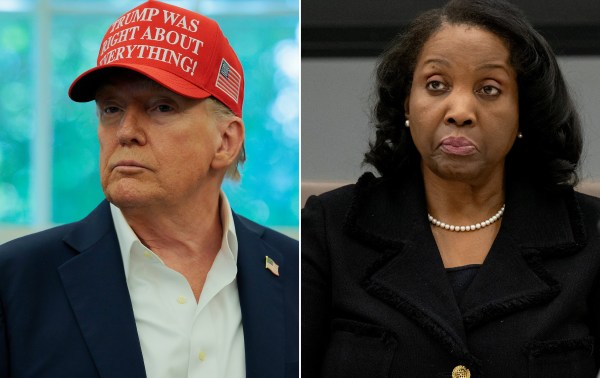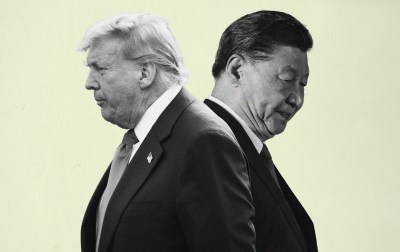“With everything going on, I must say, I still have not a clue what the Democratic message is. They are lost and out of their league, I’m afraid. And Democratic voters know it.”
Throw in a few misspellings and that could have come straight from a presidential Truth Social rant. But it wasn’t a MAGA devotee who wrote it, it was Never Trumper extraordinaire Adam Kinzinger. If even he’s unhappy with the opposition party, that party has a problem.
And it does have a problem. Check your favorite social media platform today, for instance, and you’ll find leftists rebutting Donald Trump’s crackdown on Washington, D.C., by chirping that the crime rate in the city is falling. That’s true, and it’s relevant, but it’s also a terrible argument coming from a faction that many Americans already find too complacent about urban dysfunction. Crime in Washington is getting better, but it’s bad, and “bad” isn’t acceptable. Every Democratic critique of Trump’s authoritarian power play should start there.
So I know what Kinzinger means about the left’s ineptitude, just as I know what pundits mean when they note the president’s knack for placing his opponents in lose-lose situations. D.C. again provides an example: Mayor Muriel Bowser now faces a no-win choice between resisting Trump’s takeover (“soft on crime!”) or acquiescing in it (“soft on fascism!”). The art of demagoguery is reducing all policy differences to “us vs. them” choices and daring your enemies to align themselves with “them,” and the president is quite the artist.
As a non-paying reader, you are receiving a truncated version of Boiling Frogs. You can read Nick’s full newsletter by becoming a member here.
Still, there’s something irksome to me about scolding Democrats for not rising to the occasion politically. It’s not stupidity that’s left them struggling to find a compelling “message.” It’s the fact that American voters don’t much care about the single most compelling development in national politics, the president’s ongoing attempt to turn the United States into an autocracy.
What “message” is the opposition party reasonably supposed to advance in a situation like that?
Imagine if the electorate had reacted with similar ambivalence to 9/11. Yes, the attack was terrible and national security is an important issue, most Americans might have assured pollsters. But more important than the economy or inflation or immigration? Please. Let’s keep things in perspective!
In that America, where the most frightening long-term threat to the country just isn’t an urgent priority for the majority, how should the opposition react? If it browbeats Americans to try to get them to take the threat more seriously—the future of the United States is at risk—it will be deemed hysterical and “out of touch.” If it tries to meet voters where they are, chattering about unemployment and egg prices and anything except the elephant in the room, it will be seen as unforgivably weak on terrorism by the substantial minority that does view the threat as dire.
Another lose-lose situation.
The problem for Democrats isn’t that they have “no message.” They do. The problem is that, in light of last November’s election results, there’s no reason to think American voters will be moved by that message—namely, that our supposed anti-China president wants the U.S. government to look a lot more like the Chinese government and he isn’t being subtle about it.
On that note, let me introduce you to E.J. Antoni.
Labor pain.
Antoni is Trump’s nominee to replace Erika McEntarfer as head of the Bureau of Labor Statistics. For an administration that’s already assembled a murderer’s row of kooks and yes-men—Robert F. Kennedy Jr., Kash Patel, Pete Hegseth—he’s a perfect fit.
Hegseth is a good analogue for him. Both are young, conspicuously inexperienced in their areas of alleged expertise, and distinguished solely by their willingness to say things in right-wing media that Donald Trump wants to hear. Antoni received his Ph.D. just five years ago and “doesn’t appear to have published any formal academic research since his dissertation,” according to the Wall Street Journal. His dissertation has been cited in scholarship once, by a nonprofit he used to work for. By comparison, McEntarfer’s work has been cited 1,327 times.
Currently, he’s employed by the Heritage Foundation, a onetime conservative think tank that’s remade itself as a debased postliberal mouthpiece for all things MAGA. Antoni’s output there has “mostly been on fiscal issues such as taxes and Social Security, not on the labor and macroeconomic topics” that the BLS focuses on. All of which might be forgivable if he had demonstrated unusual insight into, say, how to make gathering jobs data more efficient, but he hasn’t. On the contrary, the contempt he inspires among credible economists—on both sides—is remarkable.
You can’t appreciate the caliber of hackery we’re dealing with here without reading Dominic Pino’s post yesterday at National Review, where the endless list of Antoni’s economic errors begins to feel like a 50-car pile-up. He’s the sort of person who dismisses BLS data as unreliable when it’s bad and then eagerly cites it when it appears to prove one of his theories about employment. He reminds me of the “Unskewed Polls” guy, who became a sensation among Republicans in 2012 pushing mumbo jumbo about how the many surveys pointing to a Mitt Romney defeat were systematically wrong.
Antoni has performed the same role in right-wing media over the last few years for jobs numbers (he insists that Joe Biden’s economy entered a recession in 2022 and never emerged) and now he’s going to play it for the president, “unskewing” labor statistics that the global economy relies on—or perhaps doing away with them entirely, at least on the traditional monthly basis. Dispatch contributor and serious economist Jessica Riedl put it bluntly: “Senators who vote to confirm Antoni are voting to essentially eviscerate the BLS and its jobs data.”
Which, of course, is the point from Trump’s perspective. He wants a government that won’t embarrass him by publishing information that makes him look bad, just like the one Xi Jinping has. (He can barely tolerate a private sector that publishes information that makes him look bad.) If the only way to do that is to completely discredit federal agencies that still enjoy a degree of independence and public respect, that’s what he’ll do.
“Few people trust China’s economic data because they know the government serves the interests of the ruling Communist Party,” the Journal warned the president in an editorial. “Mr. Antoni will have to take off his MAGA hat if he wants to ensure that the public and markets can trust BLS data.” But if Trump wanted someone in charge who would “take off his MAGA hat,” he could and would have nominated literally anyone else.
He made the selection that he did because he’d rather live in a world where no one trusts what the U.S. government says than a world where everyone trusts what the U.S. government says and there’s a chance that it might say something discouraging about him. Postliberalism aims to convince Americans that the only authority worthy of trust is the leader; to reply to that by complaining that the leader is undermining trust in a rival authority is to miss the point entirely.
Trump won’t be chastened by comparisons to China. If anything, I imagine that when he chose Antoni, he thought, “If it works for Xi, it’ll work for me.”
That’s sort of become his motto.
Sinification.
Increasingly, I think that, to MAGA, hating China is the foreign-policy equivalent of hating crime.
MAGA populists don’t hate crime. They elected a criminal, didn’t they? They cheered when he pardoned thousands of fellow convicts. It’s hard to imagine an offense so repulsive that they would want one of their political heroes prosecuted if he were credibly accused of it. (Ahem.) To the right (and much of the left), whether crime is problematic depends on who the victim and the suspect are. But it’s good politics to posture as hating crime because swing voters find it relatable, especially in contrast to the bleeding hearts of the Democratic Party.
Hating China serves a similar purpose. What’s not to hate? It’s totalitarian. It practices genocide against the Uyghurs. It gave the world COVID, probably through shoddy lab work. It menaces free nations in the Far East. And it’s devastated middle America twice, first by luring away domestic manufacturing with cut-rate labor and second by producing the fentanyl that kills thousands of people here at home each year.
Even most Democrats hate China. You can’t go wrong politically positioning yourself as the rootin’-est tootin’-est China hawk in town, as Trump and his sycophants have done.
But many nationalists don’t actually hate China. The president doesn’t even bother to pretend to hate China anymore, frankly. He did hit them with an unusually stiff tariff on “Liberation Day,” but that was quickly dialed down, to the point where we’re now imposing stiffer rates on Switzerland and Brazil than we are on Beijing. Within the last 24 hours, in fact, Trump extended the deadline for reaching a trade deal with China by another 90 days rather than let new, higher tariffs take effect. He’s reliably understanding whenever his friend Xi needs an extension on something.
Dogmatic nationalists can’t truly hate China because they’re too ideologically sympathetic to the ruthlessness with which the Chinese model of government permits suppression of opponents. Trump has been surprisingly candid about that over the years. From admiring the display of “strength” in Tiananmen Square to celebrating the life tenure that Xi enjoys to allegedly encouraging concentration camps for the Uyghurs to marveling at the cunning of a dictator who’s able to rule with an “iron fist,” the president has a longstanding case of autocrat envy.
If you gave him a choice between executive powers under the U.S. Constitution and executive powers under Chinese communism, there’s no doubt which he would choose. And he is choosing, as best he can. The last six months of executive action during his second term can be understood as piecemeal sinification of the U.S. government.
The most obvious example is Trump’s experiments with state capitalism, “in which the state guides the decisions of nominally private enterprises.” Twice recently, first with the sale of U.S. Steel to Japanese interests and now with federal approval for Nvidia’s sale of chips to China, the U.S. government has demanded and obtained some sort of continuing interest in the acquisitions. If you want to do business in China, the regime is a party to the deal. Same here now.
Ideological purification is another common priority between the president and the Chinese. When news broke yesterday that his administration is conducting a “comprehensive internal review” of exhibits at the Smithsonian to make sure that “divisive or partisan narratives” aren’t included (one can guess what that means), it took a minute before it occurred to me to wonder whether the White House even has the authority to do such a thing. Of course he’s going to try to rewrite the historical record in his favor, authorized or not; he’s already begun on matters ranging from January 6 to Russiagate. He leads a Maoist movement and ideological purification is what Maoists do.
Building a police state? Trump is working on that too, so far mostly at the expense of immigrants and citizens who “look like” immigrants. But on his watch the federal government has begun to ramp up its surveillance capabilities, a hallmark of the Chinese government, by consolidating the stores of data it maintains on Americans. And as I’ve argued several times, by rolling out the military for police work in situations that don’t require a military response, he’s getting us all comfortable with the idea of a lethal force that’s directly answerable to him confronting domestic “enemies.”
I could go on and on. In China, the supreme leader unilaterally decides trade policy that will affect millions of people. The same is now true in America, whatever Article I of the Constitution might say about it. In China, bureaucrats abuse their immense power over every aspect of society to enrich themselves illicitly. The same is now true in America at the highest level. In China, the regime cooks employment numbers in order to make the president look good. The same is now true in America—or will be, as soon as E.J. Antoni is safely installed at the BLS.
And I think he will be.
Confirmation.
There’s a small degree of suspense over whether the Senate will confirm Antoni. As supine as Congress has become, it did quietly tell the president no when he nominated Matt Gaetz to be attorney general, forcing his withdrawal. In theory, that could happen again.
But why would it?
The chairman of the relevant Senate committee overseeing Antoni’s nomination happens to be Bill Cassidy, whom you may remember for having disgraced himself utterly when he supported Robert F. Kennedy Jr.’s nomination. Cassidy enabled the ongoing destruction of American public health for the sake of staying in the president’s good graces ahead of next year’s Senate primary in Louisiana, modestly improving his chances at reelection. He’d be a fool to squander that sacrifice and make an enemy of Trump now by drawing the line at Antoni.
Even if he’s willing to deny the president his dream of leading a government like Xi’s where no one dares tell him no, what would it achieve? Gaetz’s withdrawal didn’t ultimately deliver a competent, respectable attorney general and Antoni’s withdrawal won’t deliver a competent, respectable BLS commissioner either. Trump wants an unfit partisan hack in the job and the Republican-led Senate has no objection to that. If they bork Antoni, it’ll be for the same narrow reason that they borked Gaetz—because his embarrassing unfitness for the job was a little too obvious.
I suspect he’ll be confirmed, though, underlining the fact that the U.S. Congress now wields just about as much real authority as China’s National People’s Congress does.
And that’s the way postliberal Republicans want it. They’re eager to emulate the most repellent features of China’s government because they regard Western liberalism as a common enemy. That’s also why the fate of Taiwan is more likely to be decided by a modern Molotov-Ribbentrop pact between our two countries than by a war: Much of the populist right plainly feels more ideological kinship with Beijing than with Taipei and will surmise that there’s more to be gained by allying against liberalism than by fighting each other.
They don’t hate China half as much as they hate that America doesn’t function more like China. If nothing else good comes from this latest national embarrassment involving Antoni, let it be growing awareness of that fact.








Please note that we at The Dispatch hold ourselves, our work, and our commenters to a higher standard than other places on the internet. We welcome comments that foster genuine debate or discussion—including comments critical of us or our work—but responses that include ad hominem attacks on fellow Dispatch members or are intended to stoke fear and anger may be moderated.
With your membership, you only have the ability to comment on The Morning Dispatch articles. Consider upgrading to join the conversation everywhere.